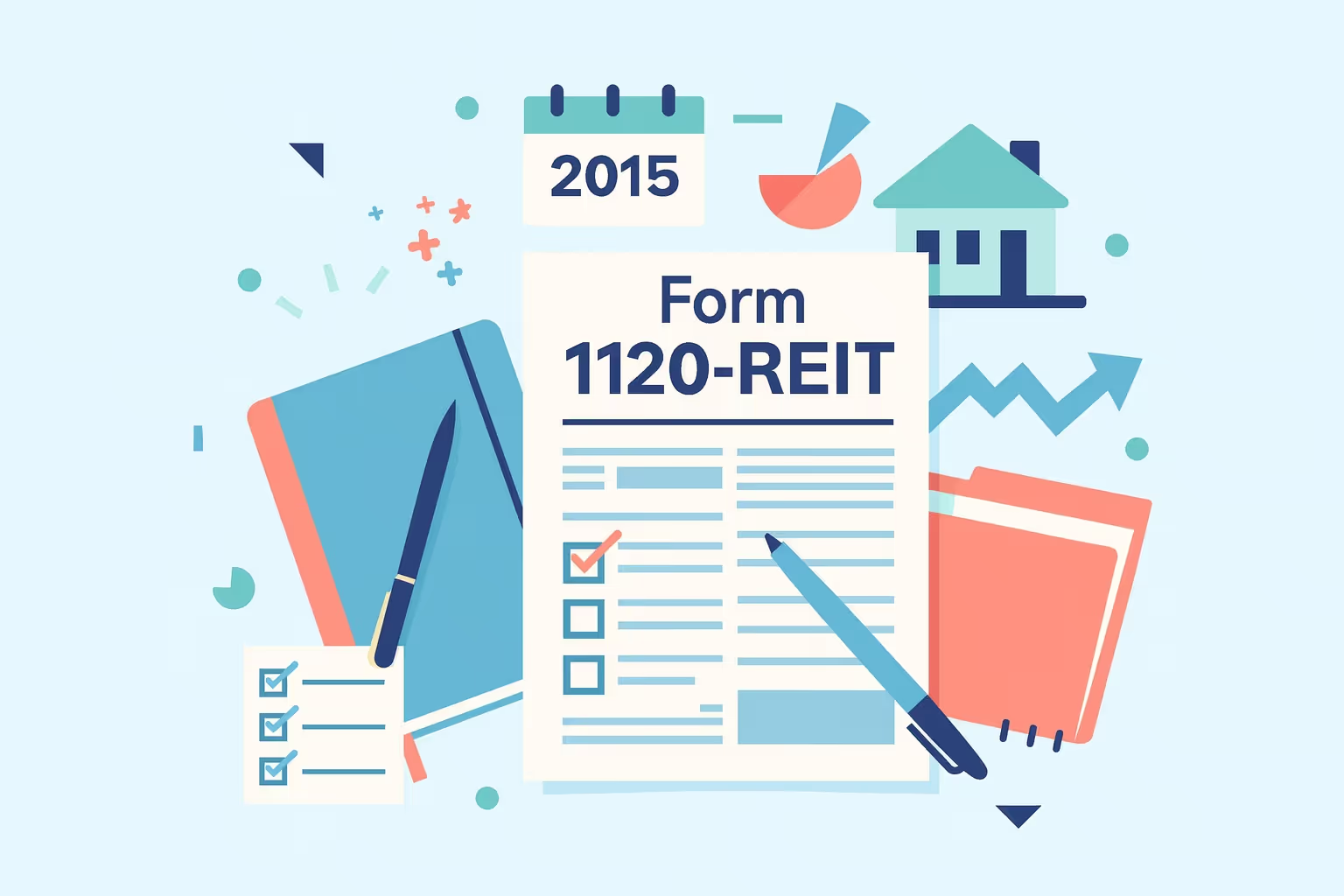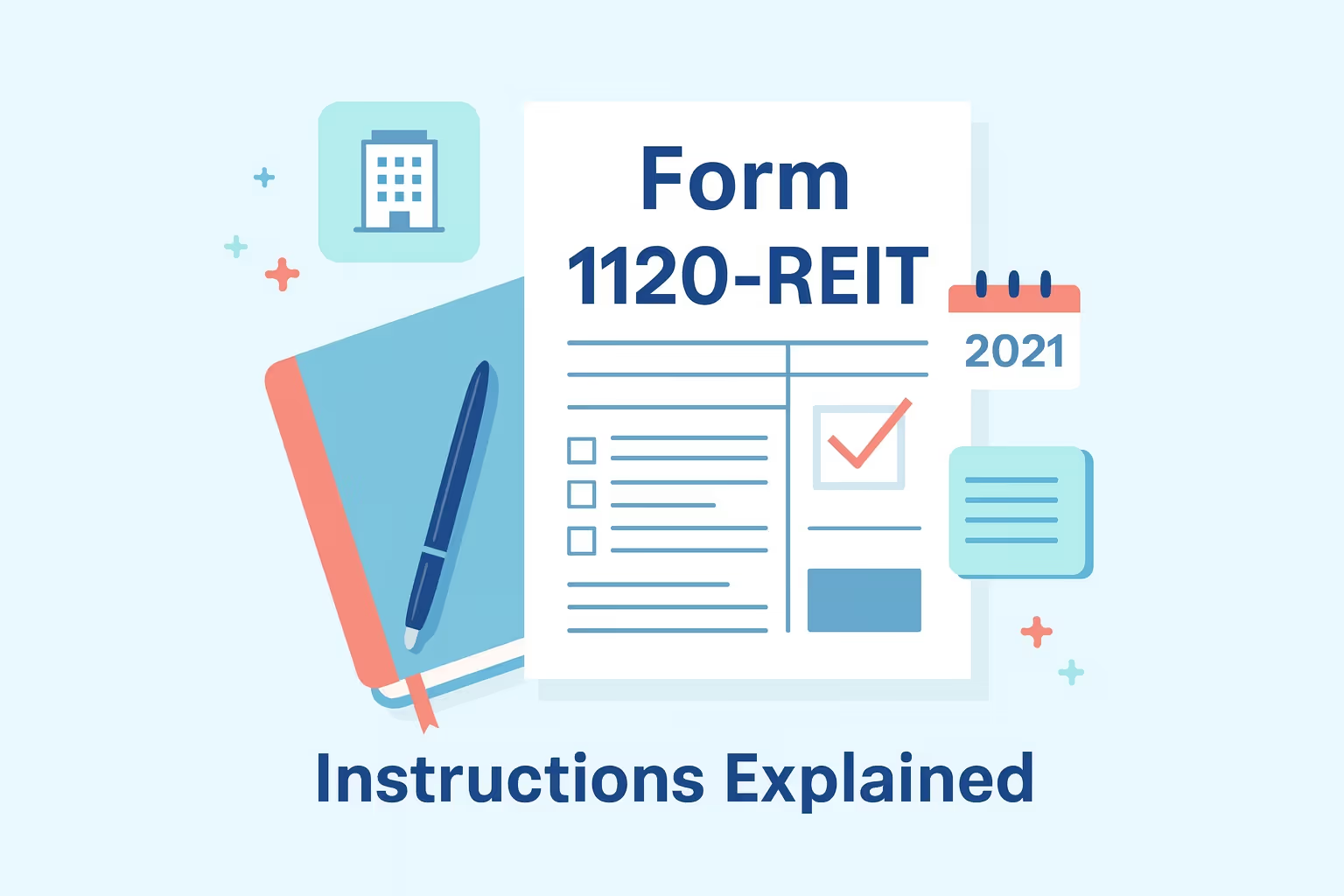
Para qué sirve el formulario 1120-REIT (2022) del IRS
Formulario 1120-REIT del IRS (2022) es la declaración de impuestos sobre la renta utilizada por los fideicomisos de inversión inmobiliaria para declarar los ingresos, las deducciones, los créditos y la obligación tributaria general del año. Un fideicomiso de inversión inmobiliaria presenta este formulario cuando ha elegido el estatus de REIT y sigue cumpliendo con sus obligaciones tributarias federales. El formulario ayuda a la entidad a declarar los ingresos por alquileres, intereses, ganancias de capital y dividendos ordinarios pagados a los accionistas.
Un REIT también debe demostrar que cumplió con la regla que le exige distribuir al menos el 90% de sus ingresos imponibles cada año. El formulario 1120-REIT respalda esta revisión y garantiza que la entidad siga reuniendo los requisitos para recibir el tratamiento del REIT en virtud de las leyes tributarias federales. Encuentre el Formularios del IRS, cronogramas e instrucciones que ayudan a presentar o modificar el formulario 1120-REIT.
Cuándo utilizaría el formulario 1120-REIT del IRS para 2022
Un fideicomiso de inversión inmobiliaria presenta el formulario 1120-REIT 2022 del IRS cuando necesita presentar su declaración de impuestos sobre la renta para el año tributario de 2022 y no ha cumplido con la fecha límite original. También puede usar el formulario para actualizar la información ya enviada al Servicio de Impuestos Internos.
Presentaría este formulario cuando:
- El REIT no cumplió con la fecha límite del 17 de abril de 2023: Es posible que necesite este formulario si la entidad descubre declaraciones sin presentar o registros incompletos y debe presentarlos fuera de plazo.
- Debe presentar una declaración enmendada: Este formulario es obligatorio cuando el REIT debe corregir los ingresos, las deducciones, los créditos u otros detalles de los informes.
- Recibe un aviso del IRS: El formulario puede ser necesario si la notificación aborda las presentaciones faltantes, las discrepancias en los saldos o las preguntas sobre los ingresos imponibles.
Plazo de reembolso
Un REIT aún puede solicitar un reembolso para 2022 si la presentación llega al IRS antes del 17 de abril de 2026. Este período de tres años se aplica incluso cuando la entidad presenta su declaración fuera de plazo o modifica su declaración.
REIT del año fiscal
Las entidades con un año fiscal que finaliza el 30 de junio tienen fechas de presentación separadas. Estos REIT deben usar el cronograma que se aplica al final del año, incluso cuando presenten una declaración tardía o enmendada. Presentar el formulario 1120-REIT a tiempo o corregirlo con prontitud ayuda a proteger el estado del REIT y garantiza que la entidad siga cumpliendo con sus obligaciones tributarias federales.
Descubra cómo Reseñas del IRS declaraciones corporativas tardías o modificadas y qué sucede cuando un REIT tiene años tributarios sin presentar.
Reglas o detalles clave para el año tributario 2022
Se aplican varias reglas al formulario 1120-REIT 2022 del IRS, y cada una de ellas afecta la forma en que un fideicomiso de inversión inmobiliaria prepara su declaración de impuestos sobre la renta del año. Estos detalles permiten a la entidad calcular su obligación tributaria, cumplir con las obligaciones tributarias federales y mantener su estado de REIT.
Los puntos esenciales para 2022 incluyen:
- Multa más alta por presentación tardía: La multa mínima aumenta a 450$ cuando la devolución se realiza más de 60 días después de la fecha de vencimiento.
- Informes crediticios de nómina: Algunos créditos de nómina relacionados con la COVID vinculados a períodos anteriores podrían seguir apareciendo en 2022. Los REIT debían seguir las instrucciones al pie de la letra para evitar la duplicación de informes.
- Cumplimiento de las pruebas de ingresos y activos: Un REIT debe demostrar que cumplió con sus pruebas anuales en función de los ingresos imponibles, los activos y las fuentes de ingresos. Acceso Instrucciones del IRS, formularios de impuestos corporativos y anexos que pueda necesitar para preparar o modificar el formulario 1120-REIT.
- Cronogramas y divulgaciones: Pueden aplicarse elementos como el Anexo J y el Anexo M-3, según el tamaño y las cuentas de la entidad. Estos anexos ayudan al IRS a revisar las deducciones, los gastos, los créditos y los detalles relacionados.
Paso a paso (nivel alto)
Presentar el formulario 1120-REIT 2022 del IRS es más fácil de administrar si sigue un proceso sencillo. Estos pasos se aplican tanto si presenta electrónicamente como si envía por correo un PDF impreso al Servicio de Impuestos Internos.
1. Revise los registros del IRS
Comience solicitando cuentas o transcripciones en IRS.gov o comunicándose directamente con el IRS. Esto le ayuda a comparar los formularios anteriores, los pagos y cualquier notificación archivada antes de completar la declaración de impuestos de los fideicomisos de inversión inmobiliaria.
2. Complete el formulario y los horarios
Complete el formulario 1120 REIT y cualquier anexo aplicable, como el Anexo D, el Anexo K, el Anexo J o el Anexo M-3. Asegúrese de que los ingresos, las deducciones, los créditos, los ingresos imponibles y las multas sean correctos para el año tributario.
3. Verifique las firmas y los archivos adjuntos
Asegúrese de que el formulario completado esté firmado por una persona autorizada para actuar en nombre de la entidad. Adjunte todos los cronogramas requeridos y los detalles justificativos, incluidas las declaraciones sobre dividendos, gastos y créditos ordinarios.
4. Presente electrónicamente o por correo
Puede presentar la declaración electrónicamente a través de proveedores aprobados o enviar la declaración por correo a la dirección correspondiente del IRS que figura en las instrucciones. Asegúrese de conservar el comprobante de presentación y una copia completa de la declaración en sus registros.
5. Organizar el pago o el reembolso
Si debe dinero, pague los impuestos antes de la fecha de vencimiento mediante opciones de pago electrónico, cuentas bancarias u otros servicios bancarios. Si le corresponde un reembolso, puede optar por el depósito directo en una cuenta corriente o de ahorros, lo que normalmente acelera el proceso de reembolso y brinda un acceso más rápido a los fondos.
Errores comunes y cómo evitarlos
- Falta el cálculo de distribución del 90%: Revise los registros de accionistas, los dividendos ordinarios y las cuentas de fin de año antes de presentarlos.
- Tratamiento incorrecto de los fallos en las pruebas de ingresos: Use la parte correcta del formulario y adjunte las declaraciones requeridas.
- Omitir las divulgaciones del Anexo J: Confirme que todas las líneas, importes y explicaciones requeridas estén completas.
- Ignorar las reglas del Anexo M-3 para entidades grandes: Verifique los umbrales de activos y adjunte el Anexo M-3 cuando sea necesario.
- EIN incorrecto o archivos adjuntos faltantes: Verifique el EIN, firme el formulario completo y reúna todos los anexos antes de presentar la solicitud.
Comprenda las opciones para reducir o eliminar las multas cuando un REIT presenta su declaración de 2022 con retraso o la corrige errores de presentación.
Qué sucede después de presentar la solicitud
El Servicio de Impuestos Internos revisa su formulario 1120-REIT 2022 del IRS y emite un aviso si necesita más detalles o correcciones. Las presentaciones electrónicas suelen ser más rápidas, mientras que las declaraciones enviadas por correo suelen tardar más. Si adeuda un saldo, los intereses y las multas continúan hasta que se pague el monto. Si espera recibir un reembolso, puede elegir el depósito directo para acceder más rápido a los fondos.
Preguntas frecuentes (FAQ)
¿Qué sucede si presento mi formulario 1120-REIT de 2022 con retraso sin recibir una notificación del IRS?
Aún puedes presentar la solicitud. Presentar la declaración de impuestos sobre la renta lo antes posible ayuda a limitar las multas y contribuye a mantener el estatus de REIT. El IRS no exige un aviso antes de enviar una declaración tardía.
¿Qué multas se aplican si mi formulario 1120-REIT de 2022 se retrasa más de 60 días?
El IRS puede cobrar una multa mínima de 450 dólares o un porcentaje de su obligación tributaria impaga, lo que sea menor. Los intereses continúan hasta que el saldo se pague en su totalidad.
¿Cómo puedo obtener las transcripciones del IRS antes de preparar una declaración tardía?
Puede solicitar las transcripciones a través de IRS.gov, por teléfono o mediante el formulario 4506-T. Estos registros ayudan a confirmar los formularios, pagos y cuentas anteriores vinculados al REIT.
¿Todavía es posible solicitar un reembolso para el año fiscal 2022?
Sí, un REIT aún puede solicitar un reembolso si el IRS recibe la declaración antes del 17 de abril de 2026. Después de esa fecha, cualquier reembolso vence según las leyes tributarias federales.
¿Debo modificar mi declaración estatal después de modificar mi 1120-REIT federal?
Muchos estados exigen presentaciones actualizadas al presentar una declaración enmendada al IRS. Los plazos estatales pueden variar, así que revisa las normas de tu estado o comunícate con su agencia tributaria para confirmar el proceso correcto.


































